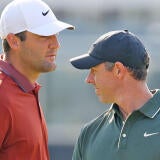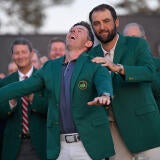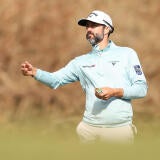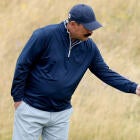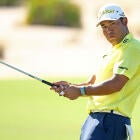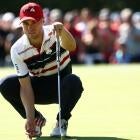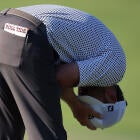How Arnold Palmer's success as last U.S. Ryder Cup playing captain added to his immense legacy
Palmer rose to the challenge while leading the United States to victory in the 1963 Ryder Cup
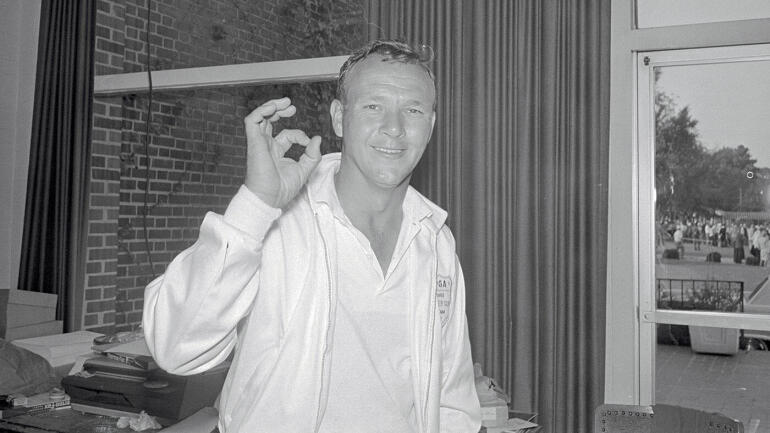
Keegan Bradley has one wish as he mulls over the decision -- set to be announce Wednesday morning -- as to whether he should become the first Ryder Cup playing captain for the United States since Arnold Palmer in 1963.
"I wish he was alive and I could call him," said Bradley in reference to Palmer, who died in 2016. "If I had one thing, I wish I could call Arnold and talk to him because I think he'd have some great advice for me."
While Palmer's advice likely would have been sage and pointed, it's impossible to know what exactly the golf icon would tell Bradley
It's conceivable to believe Palmer would encourage Bradley to suit up. "You must play boldly to win" stands one of Palmer's most famous quotes, after all. However, Palmer cared about winning first and foremost. Taking that track, he likely would have told Bradley to do whatever he believed would increase the United State's chances of securing victory over Europe.
Palmer, a seven-time major champion, was a pioneer and a thrill seeker. In 1976, he set a world record by circumnavigating the globe in a Learjet -- 57 hours, 25 minutes and 42 seconds. He often took bold, risk-averse shots on the golf course all in the name of winning. And while that gunslinger mentality contributed to some heartbreaking losses, it also resulted in Palmer ripping off one of the most historic runs of success in golf history while making himself the game's signature player.
His ultimate decision to play while serving as captain for the 1963 U.S. Ryder Cup team was not about making history, though. It was a byproduct of circumstance.
While Palmer was still considered the world's greatest golfer, his reign was in the midst of being overtaken by Jack Nicklaus, then a 23-year-old who won two of his record 18 majors that year after capturing his first major at Palmer's expense in 1962.
By all accounts, Nicklaus' inclusion on the Ryder Cup team would have been a layup decision for Palmer. However, the PGA of American had a stipulation that required that players to be members for at least five years before being eligible to compete in the Ryder Cup. Nicklaus, who turned pro late in the 1961 season, was not qualified to represent his country in the biennial competition.
The stipulation struck a nerve with Palmer, who admitted that he was "deeply frustrated" to not be able to compete in the 1959 Ryder Cup as he -- at that time -- had not been a member long enough to himself be considered. Palmer instead had to wait two more years before taking part in the 1961 Ryder Cup, a five-point win for the Americans.
Nicklaus' absence in 1963 left donut-sized hole in the U.S. roster. Coupled with the fact that the Americans were set to field a team that included four Ryder Cup rookies -- Tony Lema, Billy Maxwell, Johnny Pott and Dave Ragan -- Palmer felt compelled to take on the dual role as a player and captain.
If anyone could fill Nicklaus' shoes, it was the 33-year-old Palmer, who had won six of his seven major titles at that point. While Nicklaus would far exceed Palmer as the greatest major winner in golf history, the sport in the 1960s was largely dominated by Palmer, so it was only fitting that he made history by taking the dual role.
Led by Palmer, the Americans posted a dominant 23-9 victory over Great Britain at the Ryder Cup, one of the largest margins of victory in history by a U.S. team. Individually, Palmer went 3-1 in pairs and 1-1 in singles. He won one of his pairs matches with close friend and 1958 PGA Champion Dow Finsterwald and the other two with Billy Casper, a three-time major winner who later handed Palmer one of his most crushing defeats at the 1966 U.S. Open.
Just as key as Palmer's playing was his handling of the team's four rookies as captain. On the first day of competition, with four morning and four afternoon foursomes, Palmer decided to get his rookies into the competition early.
In the morning, he paired Pott with himself, Ragan with Casper and Lema with 43-year-old Julius Boros, who at that point had won two of his three career major titles. In the first afternoon pairing, Maxwell played with Bob Goalby, who went onto win the 1968 masters. Ironically, Palmer-Pott was the only one of the four twosomes to lose. Despite their loss, the U.S. won 2.5 of a possible 4 points, setting the stage for its dominant win.
Palmer ultimately competed in the Ryder Cup six times between 1961-73 and again served as the American team captain in 1975. He went 22-8-2 in Ryder Cup matches and remains to this day the United States' all-time leader in match wins. Palmer never lost a Ryder Cup, either as a player or captain, and in 1963, he triumphed while holding both roles.
Classic work from The King Arnold Palmer 🏆🇺🇸#GoUSA | #ThrowbackThursday pic.twitter.com/Nrt5fjH99w
— Ryder Cup USA (@RyderCupUSA) July 10, 2025
Palmer certainly did not hinder that 1963 team by playing while captaining. In fact, his leadership in both capacities was a major part of the Americans' convincing win, and thus, it has become a key part of his iconic legacy.
"I loved the Ryder Cup because it simply wasn't about playing for money," Palmer once said. "It was about playing for something far grander and more personal. I'm proud of what the Ryder Cup did for me -- and for what I contributed to my teams in six Ryder Cup competitions as a player.
"The game brings out the best in us, and the best will always bring out their games at the Ryder Cup."



